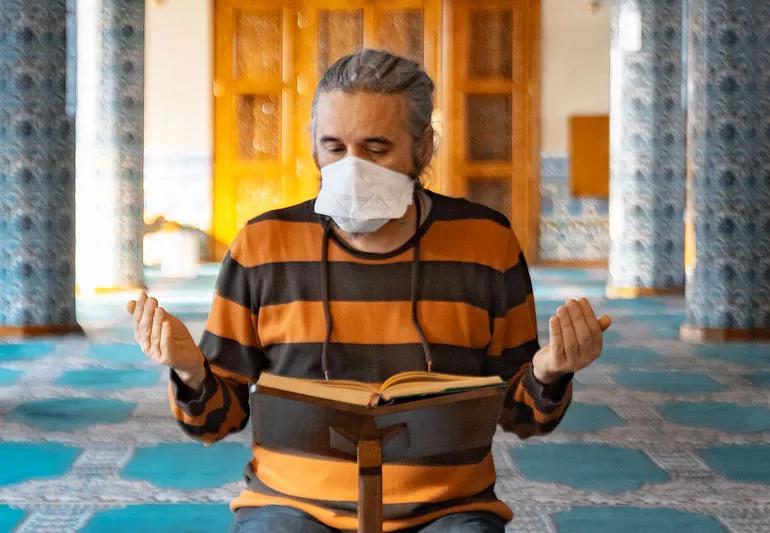Get the latest guidance from the National Muslim Task Force on COVID-19

Image content: This image is available to view online.
View image online (https://assets.clevelandclinic.org/transform/a8c60304-ed2a-4187-bd24-7f20f5ce711c/ramadanCovid-1296818635-770x533-1_jpg)
A man reading a book praying in a mosque
Ramadan is a sacred month for the Muslim community. It is a time for prayer, fasting and reflection, as well as time for gathering after each sunset prayer to break the fast (Ifatar) with family and friends. While the pandemic has altered how people observe Ramadan, it can’t take away the significance of this holy month.
Advertisement
Cleveland Clinic is a non-profit academic medical center. Advertising on our site helps support our mission. We do not endorse non-Cleveland Clinic products or services. Policy
“Ramadan is a month for inner reflection, connection with God, and charitable acts,” says Nazleen Bharmal, MD, PhD, Associate Chief of Community Health & Partnerships for Cleveland Clinic Community Care and Population Health. “Even though we’re still in a pandemic, we can still practice many Ramadan traditions in a safe manner for the overall health of the community.”
To keep members of the community safe, Muslim healthcare providers are working together with religious leaders to help clear up misinformation about COVID-19 and the vaccines. They’re also offering guidance for how to handle vaccination and social distancing guidelines during Ramadan.
On April 6, 2021, the National Muslim Task Force on COVID-19 (NMTF) and the National Black Muslim COVID Coalition (NBMCC) released a statement about safe Ramadan practices and COVID-19 vaccinations. Here is their updated guidance.
NMTF and NBMCC suggest that households and community organizations continue to follow public health and government guidance for social distancing, wearing masks in public spaces and limiting mass public gatherings.
The group recognizes that mosques (including Islamic centers, schools, etc.) play an important role in religious and communal life. They also understand that mosques will have different plans based on resources and local or state guidelines. Since mosque leadership bears an important moral responsibility to ensure the safety of their congregants, the Task Force stresses the importance of complying with local guidance and implementing safety protocols to protect community members, especially during Taraweeh and Jumu’ah prayers.
Advertisement
The Task Force also urges mosque leadership to:
As a reminder, the Task Force says the latest CDC guidance about people being in the same room without masks only applies to people who are fully vaccinated. This means people who are more than two weeks out from the last dose of a COVID-19 vaccine (either the second shot for Pfizer/Moderna or after a single shot of Johnson & Johnson). This guidance does not apply to those who are not fully vaccinated yet and should not be used as a reason to open up mosques.
The Task Force recommends that Wudu be performed at home. Public Wudu areas should be kept closed due to the high risk of respiratory droplets.
If you’re not quite sure if you should pray at home or at the mosque during Ramadan, here are a few reasons to stay home:
There have been questions about COVID-19 vaccine ingredients and if getting vaccinated during Ramadan will break a fast. Here is the Task Force’s positions on both of these topics. Should you still have questions, they recommend consulting with local Islamic scholars and healthcare professionals.
The Task Force says the COVID-19 vaccines approved in the U.S. have been deemed permissible to use, or halal. Pfizer’s and Moderna’s vaccines do not contain pork products or alcohol and were made using novel mRNA technology. They also will not change your DNA.
Johnson & Johnson’s vaccine works similarly to older vaccines. They do not have pork products but have been manufactured using fetal cell lines. However, many juridical authorities have considered this vaccine as halal based on the need to prevent the spread of the COVID-19 virus if other alternatives (mRNA vaccines) aren’t available.
Advertisement
As for vaccination breaking a fast, based on the opinion of the majority of Islamic scholars (e.g., the Fiqh Council of North America and the Assembly of Muslim Jurists of America), getting vaccinated does not invalidate fasting during Ramadan.
Dr. Bharmal is optimistic and encourages the Muslim community to protect themselves and those they love during this sacred time to prevent the spread of COVID-19.
“We wish all our Muslim colleagues and community members a fruitful, safe and healthy Ramadan.”
Advertisement

Sign up for our Health Essentials emails for expert guidance on nutrition, fitness, sleep, skin care and more.
Learn more about our editorial process.
Advertisement
The short answer: It’s complicated, but the basic care precautions still prevail, like washing your hands and isolating if you’re sick
They can feel like a typical headache or a migraine headache, but the pain can last for weeks to months
Any large social gathering — from a family birthday party to an indoor music concert — has the potential to spread serious infection
It’s important to connect with a healthcare provider, get quality sleep and balance your activities with your energy levels
Just like the flu, COVID-19 will continue to evolve every year
The duration varies, but symptoms can linger for a few days up to a couple weeks or more
Vaccination is best for prevention, but if you get sick with COVID-19, treatments are available
The virus lives best in humans, but it can last on hard surfaces, like doorknobs and railings
Type 2 diabetes isn’t inevitable with these dietary changes
Applying a hot or cold compress can help with pain
Pump up your iron intake with foods like tuna, tofu and turkey